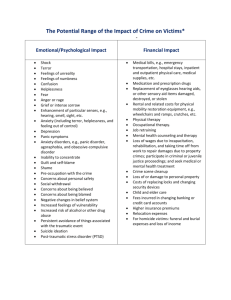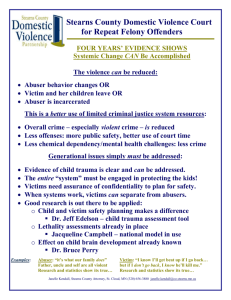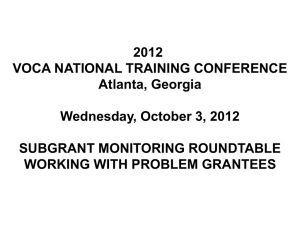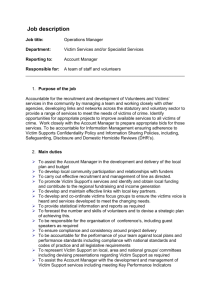Forensic Victimology 2nd Edition
advertisement
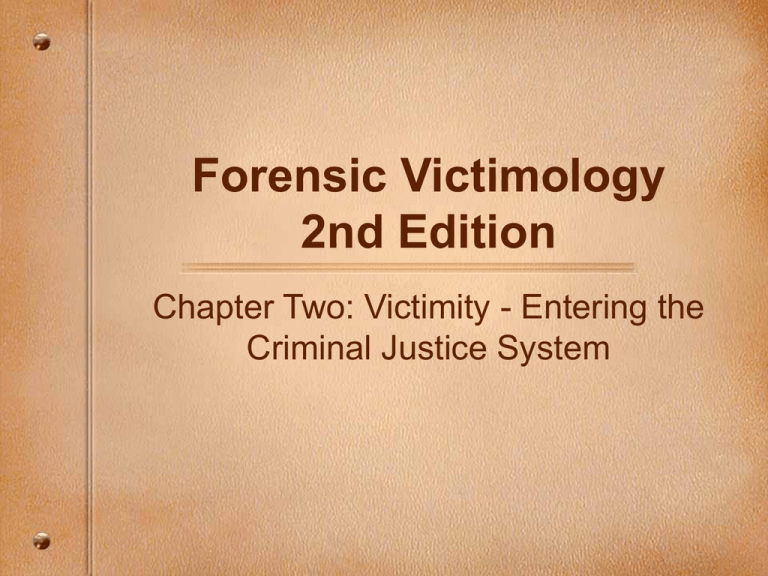
Forensic Victimology 2nd Edition Chapter Two: Victimity - Entering the Criminal Justice System Victimity • Victimity refers to the state, quality, or fact of being a victim. Understanding how the CJ system documents victim evidence is necessary for at least two reasons: 1. It contextualizes the available information – when it is collected, how it is collected, and why it is collected. 2. Unless one has been the victim of a crime or works directly with victims in the justice system, the only frames of reference that come to mind are residual images from film and television. • Film and television create a misinformed availability heuristic. Victims in the Justice System • • Before a victim enters the CJ system, the crime or crimes must be reported to law enforcement. Victims report crime for a variety of reasons, including: • • • • • Seeking an end to the harm that is being caused to themselves or others; To help catch and punish an offender; To prevent future crimes; To facilitate the recovery of property; and To sometimes they report unwillingly because it is unavoidable. Victims in the Justice System • • Not all victims report crimes to law enforcement. Crime victims may decide not to report because: • • • • They consider it a personal matter and do not want the attention; They have reported it to another authority and no longer perceive a duty to report it themselves; They do not think it is important enough to report it to police; They think reporting the crime will take too much time; Victims in the Justice System • Continued: • • • • They believe the police will not care, will not be competent, or may be biased against them; They feel there is a lack of evidence and that they will not be believed; They feel that they might be blamed for what happened; In cases involving theft, they might have recovered their valuable and consider the matter closed. Mandated Reporters • • • Mandated reporters are those bound by law to report evidence of crime, abuse, or neglect. Examples include: corrections employees, daycare workers, law enforcement employees, mental health professionals, etc.) There are legal penalties for failing in the duty to report, both criminal and civil. The Role of Law Enforcement • • Law enforcement is the branch of the criminal justice system that is legally commissioned to repond to crime. It is composed of various municipal, state, and federal agencies that are required, by law, to develop strategies and deploy personnel within an established jurisdiction that: • • • • • Facilitate the prevention of crime Respond to criminal complaints Investigate unsolved crime Arrest suspected criminals Recover stolen property The Role of Victim Advocates • • A victim advocate, when assigned to a given case, is intended as a liaison between a victim and/or the victim’s family and the criminal justice system. They facilitate the arrangement of resources, interviews and the gathering of victim information. First Contact • • Initial contact between victims and the justice system is typically made via the police or a witness. Both can present significant hurdles that must be cleared in order for the victim to successfully initiate a criminal investigation. However, this process does not always go smoothly. • Good Samaritans respond to victim peril and injuries, notify the authorities, and become eventual witnessed when EMS or law enforcement arrives. However, Bad Samaritans fail to help victims, which may result from apathy, distrust, or fear of involvement with respect to the victim or the situation as it presents itself. First Contact • Continued: • • • There is an inherent “power struggle” between the victims of crime and law enforcement officers charged with its investigation. The cumulative ineptness, ignorance, apathy, and even belligerence of those in the criminal justice system can result in double victimization. Law enforcement professionals have a duty of care. Victim Crime Data • In the study of victims and victimity, there are two major approaches to research and the development of knowledge: 1. Nomothetic knowledge – the study of the abstract, which involves the examination of groups and universal laws. 2. Idiographic knowledge – the study of the concrete, which involves the examination of individuals and their actual qualities. • Forensic victimology is oriented towards idiographic victim study, however, nomothetic victim data may be used to develop theories or provide a point of fundamental reference. Victim Crime Data • The UCR Program • • The FBI’s Uniform Crime Reporting (UCR) program compiles and publishes aggregated crime data. However, there are three main problems with the UCR data: 1. Victim underroperting 2. Agency failure to report 3. Crime data falsification (downgrading, misclassifying, and unfounding complaints).

